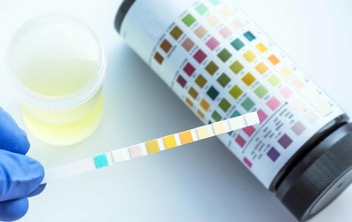New Urine Test Improves Accuracy for Early Detection of Bladder Cancer in Patients with Hematuria
June 27, 2024
Source: drugdu
 499
499
 Blood in the urine, known as hematuria, is often one of the earliest signs of bladder cancer. Although cystoscopy is recommended for patients presenting with both microscopic and gross hematuria, the detection rate for bladder cancer in these patients varies widely from 2% to 20%, leading to many unnecessary procedures. Additionally, due to the invasive nature of cystoscopy and low patient compliance, many cases of hematuria, especially microhematuria, are not promptly examined, missing early detection opportunities. This often results in diagnoses at more advanced stages, increasing both physical and economic burdens. To address these challenges, researchers have developed a simplified DNA-based urine test to enhance the early detection accuracy of bladder cancer in patients with hematuria and reduce reliance on more invasive cystoscopies.
Blood in the urine, known as hematuria, is often one of the earliest signs of bladder cancer. Although cystoscopy is recommended for patients presenting with both microscopic and gross hematuria, the detection rate for bladder cancer in these patients varies widely from 2% to 20%, leading to many unnecessary procedures. Additionally, due to the invasive nature of cystoscopy and low patient compliance, many cases of hematuria, especially microhematuria, are not promptly examined, missing early detection opportunities. This often results in diagnoses at more advanced stages, increasing both physical and economic burdens. To address these challenges, researchers have developed a simplified DNA-based urine test to enhance the early detection accuracy of bladder cancer in patients with hematuria and reduce reliance on more invasive cystoscopies.
The potential of aberrant DNA methylation as a diagnostic biomarker for various cancers, including bladder cancer, has been recognized for some time. Researchers from Genomictree, Inc. (Daejeon, South Korea) and Promis Diagnostics, Inc. (Irvine, CA, USA) had previously developed a diagnostic tool that measures methylation levels of proenkephalin (PENK) in urine DNA using a two-step real-time PCR process for detecting primary bladder cancer in hematuria patients. They have now streamlined this into a single-step procedure, EarlyTect Bladder Cancer Detection (BCD), which integrates linear target enrichment (LTE) and quantitative methylation-specific PCR (qMSP) in a closed-single tube system using real-time PCR.
The performance of EarlyTect BCD was assessed for its sensitivity and specificity and compared favorably with other multi-biomarker tests. In a retrospective training set of 105 patients, an optimal cutoff value was identified that distinguished bladder cancer from non-cancer cases, achieving a sensitivity of 87.3% and a specificity of 95.2%. In a prospective validation set involving 210 patients (122 Korean and 88 American), the test showed an overall sensitivity of 81.0% for detecting all stages of bladder cancer, with a high negative predictive value of 97.7% for ruling out bladder cancer in patients with hematuria.
Remarkably, EarlyTect BCD demonstrated 100% sensitivity in identifying high-grade noninvasive papillary carcinoma and more advanced stages of bladder cancer. These results indicate that the test could transform clinical practice by enhancing the initial diagnosis of hematuria patients, significantly reducing the number of unnecessary cystoscopies. Patients with a positive urine test could then be more confidently referred for cystoscopy by an urologist, increasing the likelihood of detecting early-stage bladder cancer.
“With the urgent requirement for early bladder cancer detection during initial diagnosis, EarlyTect BCD emerges as a promising solution with minimal complexity, heightened robustness, and, most importantly, user-friendliness, making it easy to implement in clinical laboratory practice,” said lead investigator Sungwhan An, PhD, Genomictree, Inc. “These novel diagnostic approaches may revolutionize the field of bladder cancer diagnosis, reducing bladder cancer mortality rates and treatment-associated healthcare expenses.”
Source:
https://www.labmedica.com/molecular-diagnostics/articles/294801649/new-urine-test-improves-accuracy-for-early-detection-of-bladder-cancer-in-patients-with-hematuria.html
Read more on
- China Sino Biopharmaceutical Signs Exclusive Licensing Agreement with Sanofi for Rofalcitinib March 4, 2026
- Gan & Lee Pharmaceuticals’ new PROTAC drug GLR2037 tablets have been approved for clinical trials to enter the field of prostate cancer treatment March 3, 2026
- AideaPharmaceuticals plans to raise no more than 1.277 billion yuan through a private placement to focus on the global clinical development of innovative HIV drugs March 3, 2026
- Giant Exits! Its Star Business Acquired March 3, 2026
- Focusing on cardiovascular and cerebrovascular diseases! OpenMediLead Medical Intelligence Dual Engines Launch Internal Testing, Connecting Drug Development and Clinical Diagnosis in a Closed Loop March 3, 2026
your submission has already been received.
OK
Subscribe
Please enter a valid Email address!
Submit
The most relevant industry news & insight will be sent to you every two weeks.



